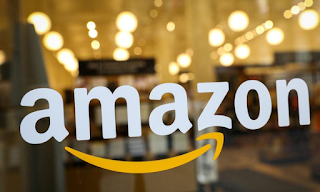Between hype and reality
Between hype and reality
There are two types of sellers’ accounts on Amazon — professional and individual. — Reuters/File
YOUNG Musaf Hanif, a software developer working with a start-up that provides ecommerce solutions and digital consultancy in Karachi, is very busy these days. Following the last month’s announcement that ecommerce giant Amazon has added Pakistan to its sellers’ list, several people have been approaching him and his firm with a similar question i.e. how fast they could launch a business on the mega online retail platform.
“Every day I encounter people who are eager to make a seller’s account on Amazon but got no idea that it isn’t free,” says Hanif while referring to the hype the Pakistan Tehreek-i-Insaf government has created on social media about Amazon. “No doubt there is a great potential but people should understand making an Amazon sellers account and choosing a target market to sell their products is not easy because of strict rules as well as tough competition.”
There are two types of sellers’ accounts on Amazon — professional and individual. For a professional account, Amazon charges $40 monthly fee and the amount got charged from the credit/debit card of the account holder as soon as the account got approved. The individual account is for those who are going to sell less than 40 items per month and Amazon charges $0.99 per item sold.
“Ninety per cent of people have no knowledge of this and those who are aware of basic things do not know that becoming an Amazon seller requires a trademark, product licence, registration, patents, etc, as its rules about intellectual property and piracy are very strict,” he says, adding that if by chance they knew about this then they lack knowledge about their target market and that which method of selling would suit them best.
Different selling methods
Hanif was referring to the two methods of selling on Amazon — Fulfilment by Amazon (FBA) and Fulfilment by Merchant (FBM). The FBA method allows a seller to send his/her product to an Amazon warehouse for shipping, while in the FBM mode a seller is responsible for the storage and shipping of all his orders.
Currently, Amazon has no warehouse in Pakistan for its FBA method. It has so far not entered into any agreement with any third party, but some reports suggested that the ecommerce giant is considering making the Pakistan Post and some other courier companies as its shipping partners.
In the wake of Covid-19 restrictions on businesses across Pakistan, medium and small companies are taking interest in setting up their websites to first sell online in Pakistan and then take it to the next level i.e. to sell their products on Amazon and other similar platforms.
But Hanif says big companies are also thinking on the same lines. A major textile exporter, he says, is also planning to launch a web store on Amazon to directly cater to the need of foreign retail buyers in addition to his export business. “They have been working on a B2B model but now they want to use Amazon for a B2C venture. We may soon see many B2B export companies on Amazon’s B2C market.”
The ExpoBird startup, with which Hanif is associated, is not alone in offering tech services to its clients for Amazon. Already several organisations across the country have been offering similar services and some of them also introduced Amazon FBA and FBM training courses for people. They have been charging a handsome amount ranging from Rs25,000 to Rs50,000 for a three-month course.
At the official level, the Trade Development Authority of Pakistan (TDAP) and Small and Medium Enterprise Development Authority (SMEDA) are offering training courses in collaboration with major private firms to those interested in becoming a seller on Amazon.
‘A cumbersome process’
Before the recent Amazon’s decision for Pakistan, some Pakistani individuals/firms having connection in the US set up LLCs there to make an Amazon account for selling textile, sports, leather, surgical goods, household items, etc.
Despite not having such overseas connections, thousands of people, including housewives, are actively engaged in online business and have been selling their products — mainly stitched, unstitched clothes, leather garments, handicrafts, etc, — and earning good money.
The most popular platform is Facebook, which unlike Amazon is completely free, where most of them are using their smartphones to take pictures of their products, getting orders and providing customer care.
For sure, almost all of them would be interested in making an Amazon account to expand their businesses, but there are certain complications that may restrict them to Facebook for now.
Sabeen Nayyer is a housewife who occasionally designs and sells clothes to her overseas acquaintances. She was very excited when she learned about Amazon’s entry to Pakistan since she wanted to explore new avenues. But her enthusiasm faded when she came to know that she needed a trademark, licence and registration along with tax details for opening an online store on Amazon.
“I am a housewife and I cannot spare time to visit government departments for obtaining trademark, licence, etc, as I heard it’s a cumbersome process. I am happy with Facebook...seems Amazon is not my cup of tea,” she adds.
However, Amazon and other similar global online retailers are not only providing a business platform, but also giving an opportunity to youths having no capital to work full- or part-time remotely as virtual assistant (VA) with already running business and earn good money. While youths in urban areas enjoy good internet connectivity, the federal government is also working on a plan to improve broadband speed in rural and mountainous areas so that rural people can also avail such online facilities.
Minister for Information Technology and Telecom Syed Aminul Haque says his ministry is not directly related with ecommerce initiatives but he is personally overseeing the project to improve the internet connectivity of rural areas and bring them at par with urban areas. “We have spent Rs31bn in less than two years to provide good connectivity to remote areas and we are in the process of coming towards 4G from existing 2G networks. The number of mobile phone users increased from 160 million in 2018 to 181m in 2021 while broadband users increased from 70m to 100m,” he says.
The long wait for buyers
Amazon has only added Pakistan to its sellers list but in real sense it is not operational here as only four per cent of its product range is available for local buyers. Hanif hopes the situation will change once Amazon opens its market for Pakistani buyers.
He says people here have been waiting for ages to buy goods directly from Amazon. Today, the shipping cost of few products available for us often surpassed the actual value of goods bought, Hanif says, adding if Amazon comes to Pakistan, it would set up a dedicated website with ‘dot pk’ domain (like it did in India with a ‘dot in’ domain) and make arrangements for product storage as well as shipping to deliver goods at people’s doorsteps.
“This will reduce the existing shipping costs, time, lessen custom duty and other levies and also provides Pakistani retailers an opportunity to do business for locals. The government would also earn revenue from Amazon if it enters domestic market,” he adds.
There’s no denying that Pakistan’s addition to Amazon sellers list is a major success, many believe moves like the one in the Finance Bill 2021-22 to impose a Rs5 per GB internet usage tax will cost heavily the PTI government’s efforts in convincing foreign firms like PayPal, eBay and of course Amazon to launch their operations from Pakistan.
Published in Dawn, June 28th, 2021


Comments
Post a Comment